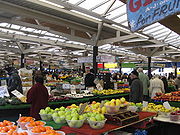
Leicester Market
Encyclopedia

Market
A market is one of many varieties of systems, institutions, procedures, social relations and infrastructures whereby parties engage in exchange. While parties may exchange goods and services by barter, most markets rely on sellers offering their goods or services in exchange for money from buyers...
in The City
Leicester City Centre
Leicester City Centre is an area covering the core inner city area and central business district of the city of Leicester, England. It is roughly delineated from Leicester's suburbs by the A594, Leicester's inner ring road....
of Leicester
Leicester
Leicester is a city and unitary authority in the East Midlands of England, and the county town of Leicestershire. The city lies on the River Soar and at the edge of the National Forest...
, England
England
England is a country that is part of the United Kingdom. It shares land borders with Scotland to the north and Wales to the west; the Irish Sea is to the north west, the Celtic Sea to the south west, with the North Sea to the east and the English Channel to the south separating it from continental...
, on Market Place just south of the clock tower
Clock Tower (Leicester)
The Haymarket Memorial Clock Tower is a major landmark and popular meeting point in Leicester, United Kingdom. It is located roughly in the middle of the area inside the ring-road, and is at the point where five major streets meet, and also close by to the junction with Cheapside.The Clock Tower...
.
It is open Monday to Saturday and has over 270 stalls. It is around 800 years old but was moved to the current site around 700 years ago. It is the largest outdoor covered market in Europe.
The outdoor market sells a wide variety of goods, particularly fruit and vegetables, but also flowers, clothes, second-hand-books, bric-a-brac and jewellery. It also has a number of permanent units, containing clothes, cosmetics, fabrics, greetings cards, a cafe and pet products.
The indoor market (1973) is a multi-level building containing the fish market and delicatessen, as well as stalls selling clothes, haberdashery, footwear, jewellery, gemstones, and confectionery.
In the centre of the market stands the Leicester
Leicester Corn Exchange
Leicester's Corn Exchange in the City centre of Leicester, England. The exchange is sited at the centre of Leicester Market.There have been buildings on the site since the 16th century, the present building was built in the 1850s by William Flint. In 1856 an upper floor and the external stone...
Corn Exchange
Corn exchange
A corn exchange or grain exchange was a building where farmers and merchants traded cereal grains. Such trade was common in towns and cities across Great Britain and Ireland until the 19th century, but as the trade became centralised in the 20th century many such buildings were used for other...
(1850), originally built as a trading centre, but now serving as a bar/restaurant. A statue
Statue
A statue is a sculpture in the round representing a person or persons, an animal, an idea or an event, normally full-length, as opposed to a bust, and at least close to life-size, or larger...
of John Manners, 5th Duke of Rutland
John Manners, 5th Duke of Rutland
John Henry Manners, 5th Duke of Rutland, KG , styled Lord Roos from 1778 until 1779 and Marquess of Granby from 1779 until 1787, was a British peer....
stands close to the Corn Exchange.
There is also a monthly Farmers Market held on the last Wednesday of every month, specializing in locally-produced organic meat, fruit and vegetables. In 2011 a new area called "Market Corner" was opened with various food and drink on offer on Fridays and Saturdays.
History
The market is protected by a Royal Charter that goes back to its origin over 700 years ago. This prohibits other markets from operating within a specified distance (6 2/3 miles) of the Leicester market.In recent years the City Council which holds the Royal Charter has begun to allow some other markets within the City. In 2009 the City Council proposed to grant a license to a private market promoter to operate a Sunday Market at the Walkers Stadium.
This has become a point of political disagreement in Leicester, with the Labour Cabinet supporting the move under the Rival Market policy, despite cross party opposition from the lead scrutiny committee.

